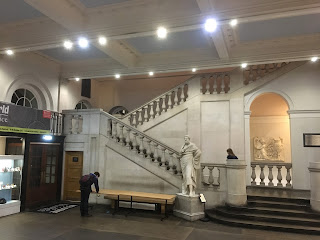Theatre Thoughts: Panel Discussion
King's College London recently ran their Arts and Humanities Festival. As part of this I attended a panel discussion titled Arts & Humanities research after Brexit: splendid isolation, Little England, Empire 2.0, or UK plc?
Not surprisingly, given the context, the bias was heavily towards Remain, and I would like to point out that this event took place prior to the McCarthyite letter sent to Higher Education establishments. It was chaired by Ziad Elmarsafy, and the panel was comprised of Professors Antoine Caze, and Raphael Woolf, Dr Benedict Schofield, and Labour MP Tulip Siddiq. The panel acknowledged, and reflected upon, this difficulty: they all broadly agreed with one another, and they recognised that this did reflect the wider opinion of tertiary education as being elitist and self-contained.
Siddiq pointed out several interesting facts: 28% of Government spending goes on tertiary education which is the lowest in the OECD and EU, yet UK Universities are second, only to America, in the world at attracting students. She stated that, shockingly, the Government refers to students as 'Revenue Centres', seeing tertiary education as a money-making venture rather than an educational advancement. This has led to an emphasis on academic grades and the cost benefit of students, rather than other forms of achievement. How else can impact be measured if not through grades or gains though?
In relation to Brexit, the panel lamented the potential loss of EU funding to Universities, which could lose up to £7billion, along with the lack of EU students wishing to attend UK institutions. Given the current political situation, however, Siddiq referred to the difficulties Governments have in planning for the future, when the here and now demands immediate attention and reaction.
In uncertain times Universities have to promote the importance of critical, objective, open and open-ended debate, emphasising the lived experience of interculturalism that a multi-national student population exposes individuals to. The output of University research, knowledge, and experience (along with the monetary contributions of students) is going to be critical in a post-Brexit Britain. In a reflective irony, Universities are likely to gain more importance in a post-truth world, despite being viewed with increasing suspicion.
King's College London, Old Entrance
Not surprisingly, given the context, the bias was heavily towards Remain, and I would like to point out that this event took place prior to the McCarthyite letter sent to Higher Education establishments. It was chaired by Ziad Elmarsafy, and the panel was comprised of Professors Antoine Caze, and Raphael Woolf, Dr Benedict Schofield, and Labour MP Tulip Siddiq. The panel acknowledged, and reflected upon, this difficulty: they all broadly agreed with one another, and they recognised that this did reflect the wider opinion of tertiary education as being elitist and self-contained.
Siddiq pointed out several interesting facts: 28% of Government spending goes on tertiary education which is the lowest in the OECD and EU, yet UK Universities are second, only to America, in the world at attracting students. She stated that, shockingly, the Government refers to students as 'Revenue Centres', seeing tertiary education as a money-making venture rather than an educational advancement. This has led to an emphasis on academic grades and the cost benefit of students, rather than other forms of achievement. How else can impact be measured if not through grades or gains though?
In relation to Brexit, the panel lamented the potential loss of EU funding to Universities, which could lose up to £7billion, along with the lack of EU students wishing to attend UK institutions. Given the current political situation, however, Siddiq referred to the difficulties Governments have in planning for the future, when the here and now demands immediate attention and reaction.
Image Source: izquotes.com
The panel pointed out the effect of xenophobic writing and opinion, during and after the Referendum campaign. The populist media seem intent on scapegoating the Other; Theatre and the arts are all about the recognition of the Other, and I wonder whether this is the effect of the research I undertook last year, which found that areas with high levels of investment in the Arts were significantly less likely to have voted Leave.
During the panel discussion, they debated whether Universities should keep to the status-quo, or whether they ought to promote more creative solutions. What is, however, the 'solution' when individuals have vastly different ideas and opinions? Universities have a duty to educate students to be creative thinkers, rather than indoctrinating into a dogma or political viewpoint. In a post-truth climate that distrusts 'experts', though, Universities, and their students and teachers, are more likely to be viewed with suspicion rather than the authoritative voice they claim to be teaching and living.
In uncertain times Universities have to promote the importance of critical, objective, open and open-ended debate, emphasising the lived experience of interculturalism that a multi-national student population exposes individuals to. The output of University research, knowledge, and experience (along with the monetary contributions of students) is going to be critical in a post-Brexit Britain. In a reflective irony, Universities are likely to gain more importance in a post-truth world, despite being viewed with increasing suspicion.
Image Source: policybristol.blogs.bris.ac.uk
In conclusion, the panel spoke for the importance of Arts and Culture in an increasingly machine-based, technology led world. To quote Caze, "Robots don't write poetry." What will it mean to be human when all of our jobs are mechanised? This is why the Arts are important. They teach us what it is to be human, how to stay human, and recognise our common, shared humanity.






Comments
Post a Comment